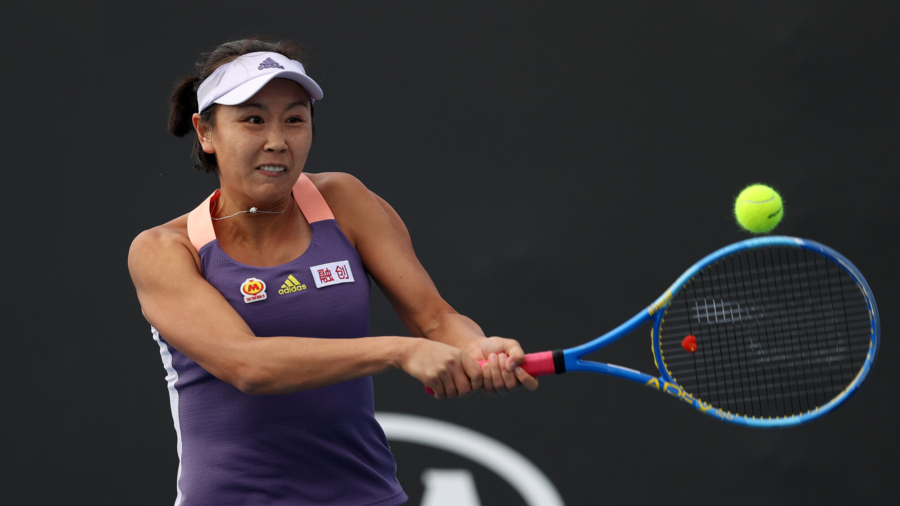The Congressional-Executive Commission on China (CECC), a bipartisan group of U.S. lawmakers, has criticized the International Olympic Committee (IOC) for not doing enough for Chinese tennis star Peng Shuai.
Sen. Jeff Merkley (D-Ore.) and Rep. Jim McGovern (D-Mass.), chair and co-chair of the CECC, voiced their criticism in two separate letters dated Nov. 24. One was sent to IOC President Thomas Bach, while the other to IOC Athletes Commission chair Emma Terho. Bach and Terho spoke to Peng on Nov. 21, amid mounting international concern about the star’s well-being.
Peng’s safety became a concern after she posted online allegations of sexual assault on Nov. 2 against Zhang Gaoli, a retired Chinese Communist Party official who was once the communist regime’s vice premier. She alleged that Zhang coerced her into sex several years ago and then the two had an on-and-off consensual relationship.
She then vanished from the public eye before reappearing in China’s state-run media over the past weekend, with one video showing her at a restaurant.
Peng ranked world No. 1 in women’s doubles in 2014 and she currently ranks 192.
On Nov. 21, Bach and Terho held a 30-minute video call with Peng. After the call, the IOC released a statement, with Peng allegedly saying that she was “safe and well” and “living at her home in Beijing.”
Additionally, the IOC statement quoted Terho saying: “I was relieved to see that Peng Shuai was doing fine, which was our main concern. She appeared to be relaxed.”
In their letter to Terho, the two U.S. lawmakers asked the commission chair “whether it is appropriate to conclude, based on a single remote video call, that a person who claimed to have been the victim of sexual assault is ‘doing fine.’”
“Ms. Peng’s current situation may make it difficult if not impossible for her to speak to her mental health, even if she chooses to do so, given the heavy censorship of her and her case, and the fact that access to her apparently is controlled by Chinese authorities,” the lawmakers added.
Beijing’s censors scrubbed Peng’s online post about 30 minutes after she put it up in early November. Since then, mentions of the tennis star have been heavily censored inside China.
The two lawmakers also told Bach in their letter how the IOC call with Peng had “failed to address many of the continuing concerns about her situation.”
“We do not know whether she has freedom of movement or speech, or whether she is in some form of enforced home detention. We do not know the state of her mental or physical health following her accusation of sexual assault, much less whether authorities are investigating the subject of her allegation,” the lawmakers wrote.
The Chinese regime uses home detention, also known as house arrest, as an extra-judicial method to silence individuals while subjecting them to arbitrary treatment. Even when they are allowed to leave their home, for purposes such as buying necessities, they are likely followed by police or disguised people working for the Chinese authorities.
One best known victims of house arrest is Chen Guangcheng, a blind Chinese dissident and lawyer, who was subjected to house arrest for nearly 20 months before he escaped to the United States in 2012. In July, he became a U.S. citizen in Baltimore.
Merkley and McGovern asked Terho to “take a more active role in defending” Peng, including demanding the Chinese regime conduct an investigation into her allegations.
As for Bach, the two lawmakers made two requests. First, the IOC president needs to arrange a video call between Peng and “a small set of journalists from independent international media outlets,” so that the tennis star has an opportunity to “speak out over the censorship levied against her and her story by Chinese authorities.”
The second request asks that Bach arrange a video call with the two lawmakers “as soon as possible.”
“Your video call with Peng shows that you can in fact use the power of your office to weigh in on a human rights concern inside China,” the lawmakers wrote.
“So we can hear from you directly about whether you will use the power of your office to address human rights concerns in China in the lead-up to the Beijing Winter Olympic Games.”
Beijing is scheduled to host the 2022 Winter Olympics in February.
From The Epoch Times

